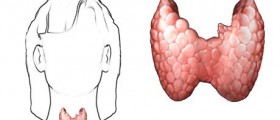
There are several thyroid gland disorders, but the two main thyroid gland conditions are hypothyroidism and hyperthyroidism, or inactive thyroid gland and overactive thyroid gland respectively. Graves’ disease is a type of high or overactive thyroid gland when the hormone called thyroxine is produced in excessive amounts, more than it is necessary.
Graves’ disease and pregnancy
When Graves’ disease occurs in pregnancy, it can be a high risk pregnancy problem because in this period, the body undergoes many changes and fluctuation in the levels of the hormones. It is normal that the amounts of thyroid gland hormones are elevated during pregnancy, but since the levels of progesterone and estrogen also rise, it may cause falsely elevation of the hormones of the thyroid gland.
Symptoms of Graves’ disease and pregnancy
Graves’ disease is the condition that causes similar symptoms to those symptoms which are characteristic for pregnancy. The most common symptoms that appear in both conditions are morning sickness, nausea, vomiting and anxiety, as well as mood swings, insomnia and goiter.
However, there are few symptoms that are only typical of Graves’ disease and not of the pregnancy. Tachycardia, increased heart palpitation and no weight gain, as well as high blood pressure, tremor, diarrhea, vision problems and baby’s increased heart rate are the symptoms of the Graves ’ disease which are not common for pregnancy.
Complications of Graves’ disease on pregnancy
Graves’ disease tends to decrease in severity when the pregnant woman reaches the second trimester. However, if high blood pressure is left untreated, it can lead to the occurrence of several disorders, which might further cause several serious conditions, such as miscarriage, premature delivery, fetal growth retardation and stillborn.
Treatment of Graves’ disease during pregnancy
When an expecting mother notices increased heart rate and unexplained weight loss, she should go and visit a doctor. When Graves’ disease is diagnosed, it is necessary to receive a treatment which is not harmful for the mother and the baby.
Many medications are not safe to take since they have side effects on the baby, but one of the few medicines for treating high blood pressure which are safe for the growing fetus is propylthiouracil. If the expecting mothers are allergic to the medications which are prescribed for the hyperthyroidism, the surgery is then recommended.













-And-Children-16-Warning-Signs-And-Symptoms_f_280x120.jpg)



Your thoughts on this
Loading...